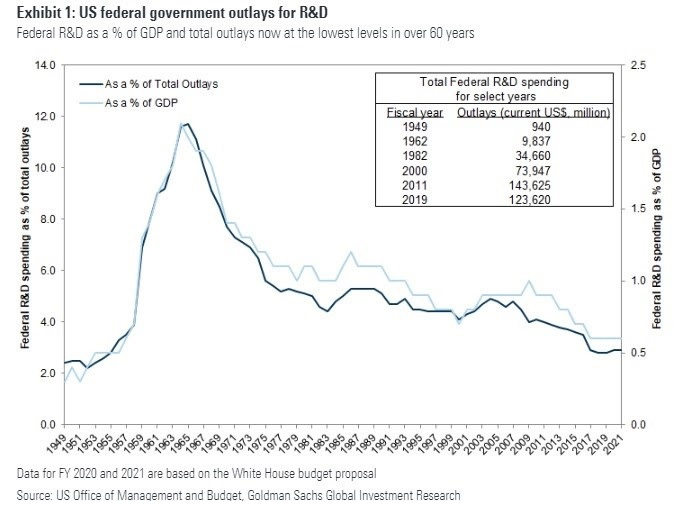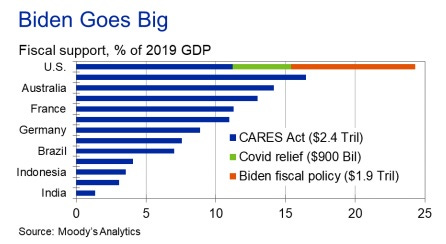'For all Mankind;' the Biden boom; moonbase alpha; CRISPR, our nuclear future, and more ...
Quote of the Issue: “We wanted flying cars and all we got was satellite internet blanketing the world, supersonic jets, 2-day vaccine development, a budding genomics revolution, a $1T self organizing internet native currency, and AI advancing at insane rate, doubling compute demand every few months.” - Patrick O’Shaughnessy on Twitter
😀 The techno-optimism of For All Mankind
Delighted to see the second-season premier of the Ronald D. Moore co-created series on Apple TV+. For All Mankind is delving even deeper into its alt-history take on a world where the Space Race never really ended (although the first man on the Moon was Russian), Apollo kept adding missions, and the next Cold War front was American and Soviet bases on the Moon. This season fast forwards from the early 1970s to the early 1980s, and the first episode catches up viewers with a blizzard of fun and fascinating news headlines.
In this world, for instance, Ronald Reagan wins the 1976 presidential election (and then reelection narrowly in 1980), resulting in no Camp David Accords but also no Soviet invasion of Afghanistan. Among other differences: The US attempt to free its hostages in Iran was successful, the US hockey team loses badly to the USSR at the 1980 Winter Olympic Games, John Lennon escapes assassination but John Paul II does not, Prince Charles marries Camilla not Diana, and no Three Mile Island nuclear disaster thanks to technology spun-off from America’s expanding presence on the Moon. The headlines also suggest more advances in solar energy tech than in our world, probably also due to the space program. And once the episode kicks into gear, we see electric cars already becoming a thing. One wonders if the added R&D from Apollo+ might have helped offset the the post-1960s productivity slowdown in the US economy (as well as in other rich nations.)
Last November, I chatted with Moore for my Political Economy podcast. We touched on FAM and America’s space program, as well as the need for more optimistic sci-fi stories. One bit on FAM:
You see the Cold War competition between the superpowers get really intense and get hot. Yes, it starts to have more of a military aspect, as Reagan brings in his philosophy and the Soviets become more aggressive because they have now had an enormous victory in the Cold War —getting to the moon first — and an increase in their prestige around the world. They are getting more allies, the Warsaw powers are more stable, and we just have a different kind of Communist threat on earth. It just felt like it’d be really interesting to now see, well, how would this play out on the moon? How does that play out in terms of the space race?
📈 The coming economic boom
I sense most Americans are severely underestimating just how growthy 2021 and 2022 might be. They shouldn’t be, not with the tsunami of spending flowing into the economy. GDP forecasts for this year of 6 percent or 7 percent are hardly uncommon, including from megabanks such as JPMorgan and Goldman Sachs. This chart from Moody’s Analytics economist Mark Zandi gives a good sense of the relative size of the US fiscal stimulus”
Of course, my concern is of the “day after” variety. Love the growth, but what is Washington doing to avoid a return to the “new normal” mode of slow growth that America has experience since the Global Financial Crisis?
🧬 What CRISPR can do for humanity
Like many breakthrough advances, we seem to spend more time fretting about downsides and ethical concerns of genetic editing rather than all the good that can come from it. A new Wall Street Journal op-ed by Walter Isaacson touches on many possible concerns. But it’s worth nothing that CRISPR pioneer Jennifer Doudna has seen her own views evolve. As described by Isaacson, Doudna started out as “instinctively against” altering a child’s genes. But then “she began to hear stories from people who had been affected by genetic diseases. … We should be cautious, she came to feel, about imposing a moratorium or hard-and-fast restrictions.” Link.
🌙 Why build a Moon base?
Americans are highly unlikely to return to the Moon by 2024, despite that goal being set by the Trump administration in 2019. The upside here is more time to make the public case for not just returning to the Moon, but staying there long term. The Progressive Policy Institute’s Caleb Watney tweet storms a number of reasons for doing so. including: (a) forces a new global space race that the US is well-suited to win, (b) an excuse for more federal R&D spending, (c) provides a future base of operations for Mars and asteroid mining. Last by hardly least: “It will look dope as hell. Imagine going out at night and looking up and the sky and seeing the twinkle of lights from the U.S. MOON BASE.” Link.
⚛ Pro-environment, pro-nuclear
The near-collapse of the Texas power grid seems to have been more a problem of insufficient weatherization than an over reliance on renewables, particularly wind power. Yet the Lone Star State failure has certainly energized proponents of nuclear as a clean and steady power source. Who are these people? In The New Yorker, journalist Rebecca Tuhus-Dubrow calls them a “small and fractious” community who “lie awake at night imagining not meltdowns but lethal heat waves and calving glaciers; they dread life on an inexorably less hospitable planet.” And instead of trying to reduce energy demand, they “focus more on the value that abundant nuclear energy could have around the world.” Link.
💉 More vaccine innovation on the way?
Malaria still kills more than 400,000 annually, with most of the victims baby and toddles in sub-Saharan Africa. So some fantastic and most-welcome vaccine news on that front as scientists have applied for a patent on a RNA-based vaccine — although not yet tested on humans — with an approach similar to the one used to develop COVID vaccines. “It's probably the highest level of protection that has been seen in a mouse model,” said Richard Bucals, co-inventor of the new vaccine and a physician and professor at Yale school of medicine. Link.
🔼 Growth is good
It’s amazing that defenses of economic growth and technological progress are necessary, but here we are. And it’s good defense offered by LSE economist John Van Reenen in a blog post. (You might also want to check out a chat I had with Van Reenen last summer for my Political Economy podcast.) He makes many good points, including this one: Growth is not simply getting bigger. Increasing GDP by having a bigger population, or increasing working hours, is not obviously a desirable thing. What we need is productivity growth. Productivity measures how much more output can be generated per input, for example GDP per hour worked. History shows us that wage growth follows productivity growth over the long run. More productivity is like growing the economic pie: it gives us choices to spend more on public service, environmental protection, redistribution or private goods. Link.
⚡ A new battery could make electric cars as convenient and cheap as gas ones
The MIT Technology Review piece concedes that “the battery field is littered with examples of startups that promised breakthrough technologies but ultimately failed.” But maybe QuantumScape is different. Maybe it has come up with a legit battery breakthrough. The company asserts it did so by solving a chemistry puzzle that has stumped researchers for nearly half a century: how to use lithium, the lightest metal on the periodic table, to boost the amount of energy that can be packed into a battery without posing a routine risk of fire or otherwise sacrificing performance. The company says it achieved this, in large part, by developing a solid version of the flammable liquid electrolyte. … The company expects the batteries to be able to boost electric vehicles’ range by more than 80%: a car that can go 250 miles on a single charge today could drive 450 miles instead. Link.
Next Steps
New plasma propulsion engine system generates a helluva lot of thrust | Link.
Sergey Brin’s Mega-airship to run off record-breaking hydrogen fuel cell | Link.
Forget 5G, the U.S. and China Are Already Fighting for 6G Dominance | Link.
Scrap the Space Launch System | Link.






